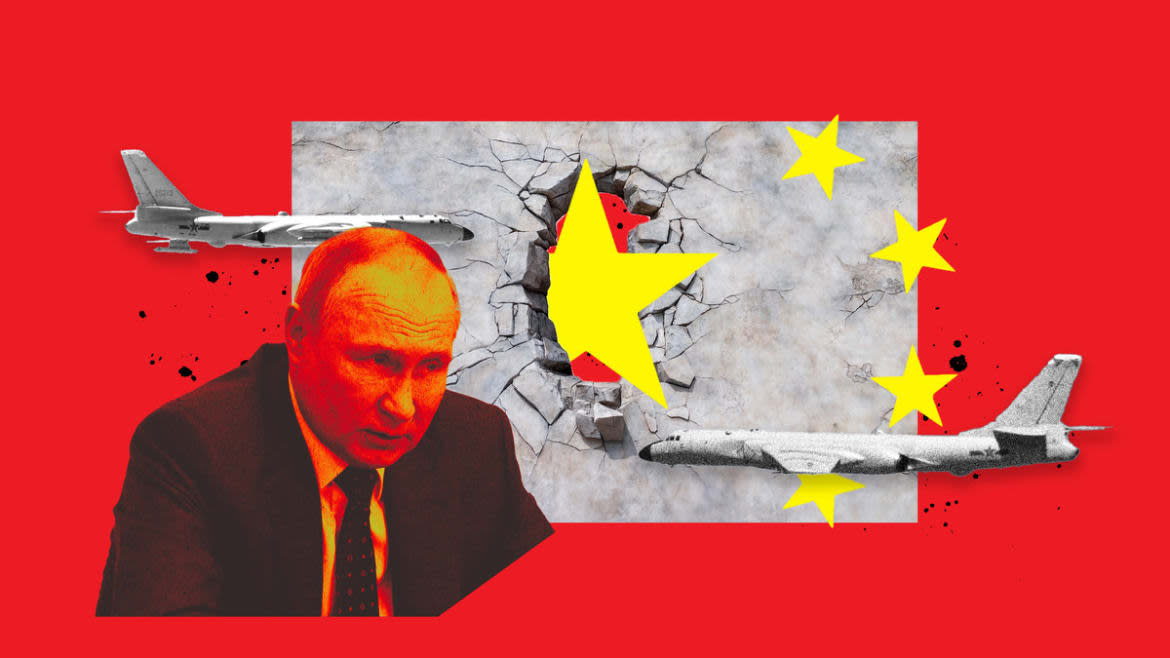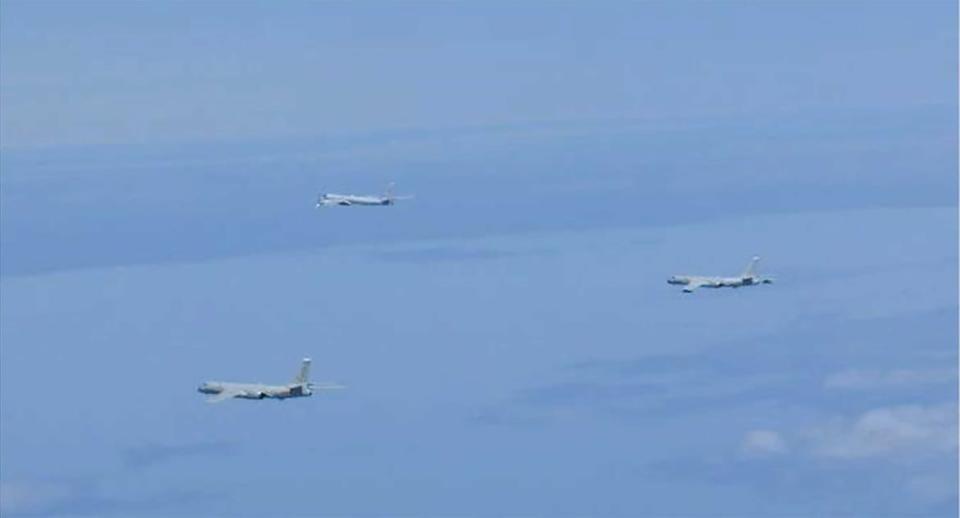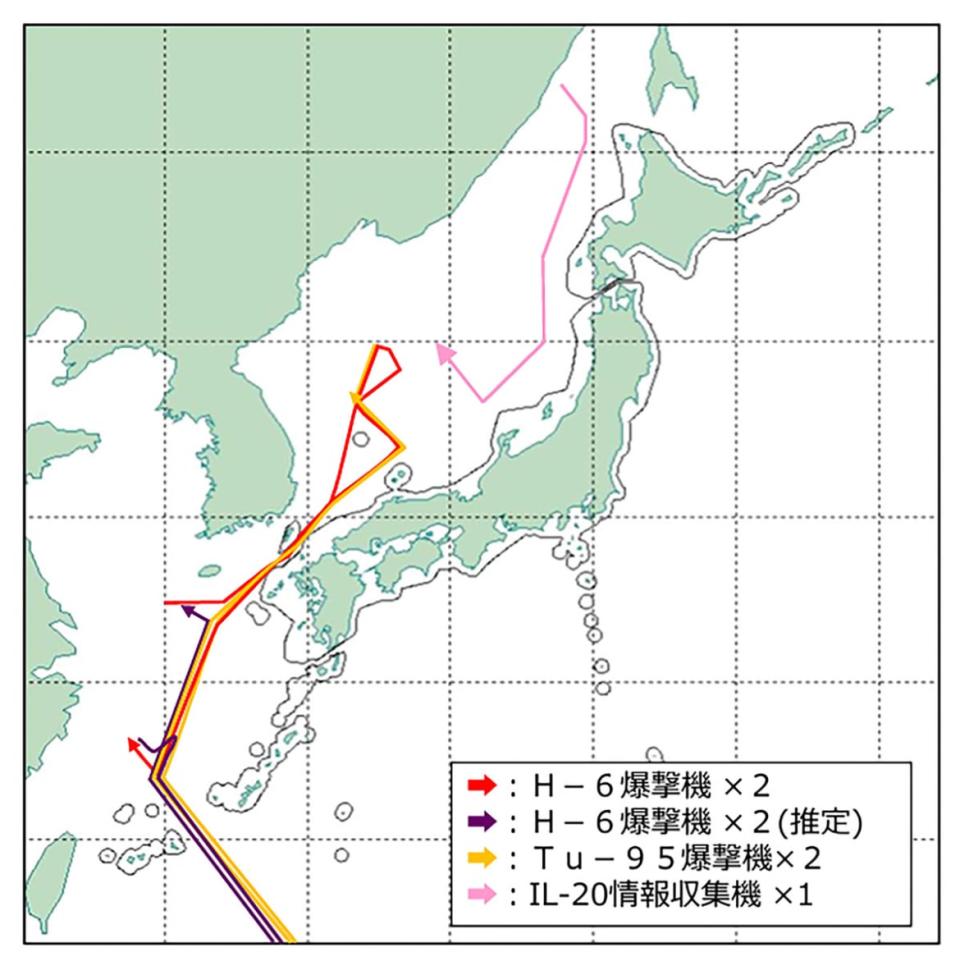Putin’s Brutality Is Exposing Our Massive China Problem

- Oops!Something went wrong.Please try again later.
- Oops!Something went wrong.Please try again later.
China and Russia flew six nuclear bombers over the Sea of Japan this week as President Joe Biden was in Tokyo. It was a dramatic show of unity that should remind us of the lessons that we’ve learned from Ukraine—and that we should be ready to apply to Taiwan, possibly soon.
China has been doubling down its intimidation tactics toward Taiwan in recent months. Beijing sent a carrier group, led by its first in-service aircraft carrier, the Liaoning, to conduct military drills in waters near Taiwan in April. “Similar exercises will be conducted on a regular basis in the future,” a Chinese naval official said. The following week, China sent 25 fighter jets and nuclear bombers into Taiwan’s air defense identification zone (ADIZ). Such incursions have become more common since September, with 77 warplanes sent in the first two days of October and 56 more on Oct. 4.
By some accounts, China would lose the battle for Taiwan—at least as things stand now. Harlan Ullman, senior advisor at the Atlantic Council, has said that with a potential defending force of 450,000 Taiwanese today, the traditional three-to-one ratio of attackers to defenders taught at war colleges dictates that China would need to deploy over 1.2 million troops. This would take thousands of ships and weeks of transfer time and, as Ullman notes, “China possesses a small fraction of the necessary ships to execute a landing of that size.”
Still, China may have the numbers to pull off an invasion by the end of the decade. On his first trip to Asia since taking office, Biden suggested on Monday that if China does invade, the U.S. would do more to defend Taiwan than it has done for Ukraine, where no U.S. troops have been sent.
Speaking at a press conference in Tokyo with Japanese Prime Minister Fumio Kishida, Biden was asked if the U.S. would militarily defend Taiwan and replied, “Yes, that’s the commitment we made.”

Photos provided by the Japanese Ministry of Defense show Chinese and Russian war ships flying near Japan on May 24, 2022.
“They’re already flirting with danger right now by flying so close,” he said, adding, “but the United States is committed. We support the One China policy, but that does not mean China has the jurisdiction to use force to go in and take Taiwan.”
Later that day, a White House official clarified that Biden’s apparent gaffe did not suggest any change in U.S. posture towards Taiwan or the One China policy. Nevertheless, within hours, Chinese Foreign Ministry spokesperson Wang Wenbin warned that China “will take firm actions to safeguard its sovereignty and security interests.”
This is a worrying prospect, especially since Taiwanese overwhelmingly oppose unification with China, which means any attempted invasion will likely be met with fierce resistance and support from the U.S. and other Western powers.
In other words, we may see the horrors of Mariupol and Bucha unfold on Taiwanese shores, particularly as Xi Jinping is apparently just as obsessed with Taiwan as Vladimir Putin is with Ukraine, and for similar ethno-nationalist reasons. For Xi, what matters most is not what Taiwanese want for themselves, but their racial identity. As he often says about Taiwan, blood is thicker than water. In other words, not even the Pacific can separate the Chinese race. And as Cindy Yu of The Spectator has pointed out, he also likes to refer to Taiwan as part of the family not as an expression of affection, but as a warning to the U.S. and others that this is a family matter, so keep out of it.
This raises the question: Now that we've taken a stand with Ukraine, and now that alliances once seen as fading have proven themselves more resilient than ever, will the line hold when it comes to Taiwan?
To be sure, there are some real differences between Ukraine and Taiwan. First and foremost is our economic relationship with China. Trade between the two biggest economies is tightly interwoven: the value of U.S. goods imports from China rose from about $100 billion in 2001 to $500 billion in 2017, largely due to China’s growing role in global supply chains. And while this has led to manufacturing job losses and technology transfers via IP theft, not to mention labor and human rights violations in places such as Xinjiang, our trade relationship with China will make many politicians reluctant to pursue conflict, and will dim the West’s willingness to sanction China as much as we have Russia.

A map created by the Japanese Ministry of Defense shows the flight paths of the Chinese and Russian aircraft.
As Timothy Snyder recently argued in a New York Times opinion piece: “We should say it. Russia is fascist.” And many already are saying it, but few are willing to do so when it comes to China despite Xi’s emphasis on racial loyalty, despite concentration camps in Xinjiang or reports of genocidal forced sterilizations, despite the extinguishing of one of Asia’s greatest democracies in Hong Kong, or an obviously undaunting thirst to invade Taiwan.
Point being, China is a more complicated problem than Russia. But given China’s political and economic weight, it’s also a problem that is important to get right. Thankfully, we’ve learned a few solid lessons from Ukraine. For one, we’ve learned that, despite what Biden said this week, direct conflict is not necessary. The U.S. can reshape Taiwan’s military with some of the same tools that have worked well in Ukraine: namely, Stinger anti-aircraft and Javelin anti-tank missiles.
Taiwan has also learned these lessons. “The Ukrainian people are very brave, and one of the tactics that has been successful so far is the asymmetric capability," Taiwan Foreign Minister Joseph Wu said this week, adding that he was specifically referring to Ukraine’s use of Stinger and Javelin missiles, and that although Taiwan has some of these already, it wants to stockpile more.
But China has learned these lessons too. According to Gerald Brown, a D.C.-based defense analyst, some of the key takeaways Beijing will likely pull from Ukraine are the value of asymmetric weapons for Taiwan, the importance of rock-steady logistics, and the need to strike with overwhelming force in order for an invasion to succeed.
“Modern technologies allow high-cost systems necessary for an invasion to be defeated by relatively low-cost systems such as anti-ship missiles and Stinger missiles, and this situation is exacerbated by the defense dominant nature of the region in which the PLA must traverse the Taiwan Strait to engage,” Brown said. “Rather than cause hesitation from the PLA, I’d venture to say it will push them to double down and ensure they approach the invasion with overwhelming force. The conflict in Ukraine has made it apparent that the fait accompli may not be a realistic model for success.”
In other words, both sides are learning the same lessons and trying to counter their use, bringing to mind an old expression: what happens when an unstoppable force meets an immovable object? One thing that happens is you end up with a lot of innocent lives lost. To prevent this, we have to exhaust diplomatic measures without falling into the trap of pursuing diplomacy. We also have to prepare Taiwan for the coming threat, and unlike with Ukraine, we have to start now.
Get the Daily Beast's biggest scoops and scandals delivered right to your inbox. Sign up now.
Stay informed and gain unlimited access to the Daily Beast's unmatched reporting. Subscribe now.

